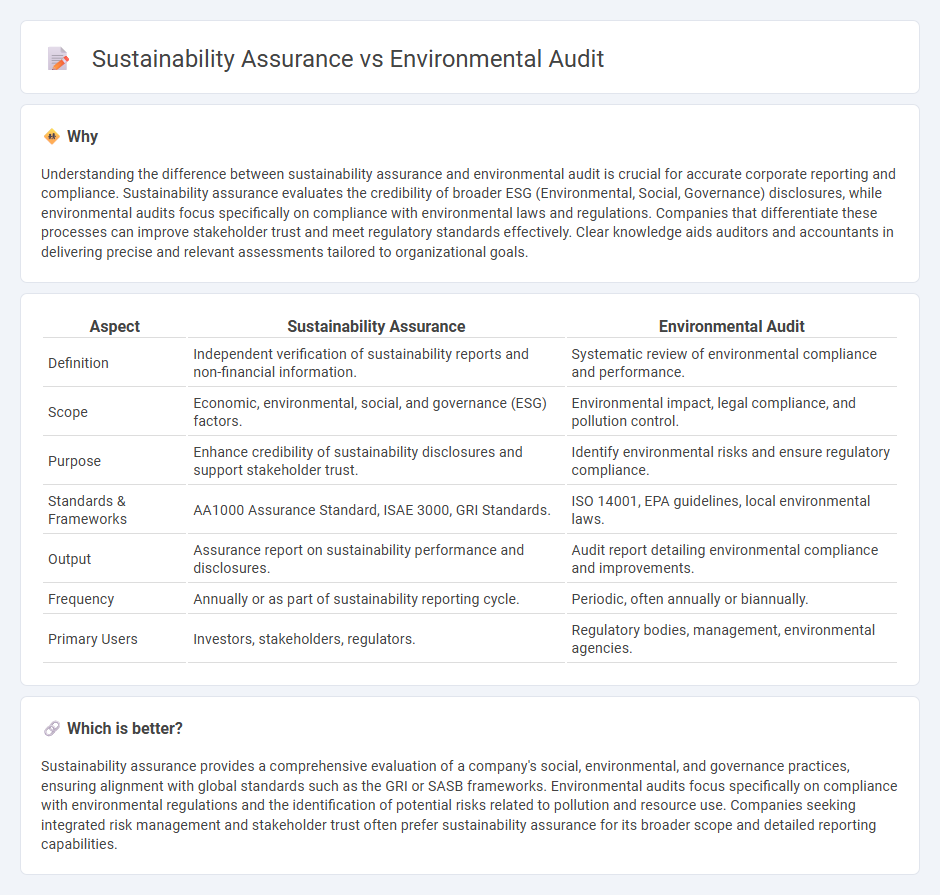
Sustainability assurance evaluates the accuracy and reliability of a company's sustainability reports, focusing on social, environmental, and governance performance against established frameworks. Environmental audits specifically assess compliance with environmental regulations, identifying risks, and measuring the impact of business activities on natural resources. Explore the distinctions between these practices to enhance your understanding of corporate responsibility and regulatory adherence.
Why it is important
Understanding the difference between sustainability assurance and environmental audit is crucial for accurate corporate reporting and compliance. Sustainability assurance evaluates the credibility of broader ESG (Environmental, Social, Governance) disclosures, while environmental audits focus specifically on compliance with environmental laws and regulations. Companies that differentiate these processes can improve stakeholder trust and meet regulatory standards effectively. Clear knowledge aids auditors and accountants in delivering precise and relevant assessments tailored to organizational goals.
Comparison Table
| Aspect | Sustainability Assurance | Environmental Audit |
|---|---|---|
| Definition | Independent verification of sustainability reports and non-financial information. | Systematic review of environmental compliance and performance. |
| Scope | Economic, environmental, social, and governance (ESG) factors. | Environmental impact, legal compliance, and pollution control. |
| Purpose | Enhance credibility of sustainability disclosures and support stakeholder trust. | Identify environmental risks and ensure regulatory compliance. |
| Standards & Frameworks | AA1000 Assurance Standard, ISAE 3000, GRI Standards. | ISO 14001, EPA guidelines, local environmental laws. |
| Output | Assurance report on sustainability performance and disclosures. | Audit report detailing environmental compliance and improvements. |
| Frequency | Annually or as part of sustainability reporting cycle. | Periodic, often annually or biannually. |
| Primary Users | Investors, stakeholders, regulators. | Regulatory bodies, management, environmental agencies. |
Which is better?
Sustainability assurance provides a comprehensive evaluation of a company's social, environmental, and governance practices, ensuring alignment with global standards such as the GRI or SASB frameworks. Environmental audits focus specifically on compliance with environmental regulations and the identification of potential risks related to pollution and resource use. Companies seeking integrated risk management and stakeholder trust often prefer sustainability assurance for its broader scope and detailed reporting capabilities.
Connection
Sustainability assurance and environmental audit are interconnected through their focus on verifying the accuracy and reliability of environmental information disclosed by organizations. Environmental audits assess compliance with environmental regulations and identify areas for improvement, while sustainability assurance provides independent validation of sustainability reports, enhancing stakeholder trust. Both processes rely on systematic data collection and analysis to ensure transparency and accountability in environmental performance reporting.
Key Terms
Environmental audit:
Environmental audit systematically evaluates a company's compliance with environmental regulations and identifies areas of environmental risk, focusing primarily on operational processes and resource usage. It measures the effectiveness of environmental management systems and mitigates potential legal liabilities related to pollution, waste management, and emissions. Explore more to understand how environmental audits drive corporate environmental responsibility and operational improvements.
Compliance
Environmental audits primarily evaluate a company's adherence to environmental laws, regulations, and internal policies, ensuring compliance with legal standards to minimize environmental risks and liabilities. Sustainability assurance goes beyond compliance by verifying the accuracy and reliability of sustainability reports, encompassing economic, social, and environmental performance to support transparent stakeholder communication. Explore the distinctions to enhance your organization's environmental and sustainability governance.
Environmental impact
Environmental audits systematically assess a company's operations to identify and measure its environmental impact, focusing on compliance with regulations and pinpointing areas for improvement in resource usage, emissions, and waste management. Sustainability assurance, on the other hand, provides stakeholders with confident verification of a company's broader sustainability claims, including environmental, social, and governance (ESG) aspects, ensuring transparency and accountability in sustainability reporting. Explore deeper distinctions and methodologies in environmental impact evaluation to understand how organizations can enhance their environmental performance.
Source and External Links
Environmental Audit and its Importance - An environmental audit evaluates a company's environmental performance, ensuring compliance with environmental laws and identifying areas for improvement.
Environmental audit - Environmental audits are evaluations intended to identify gaps in environmental compliance and management systems, with corrective actions.
What is the Process for an Environmental Audit? - The process for an environmental audit includes planning, reviewing policies, assessing performance, and reporting findings to management.
 dowidth.com
dowidth.com